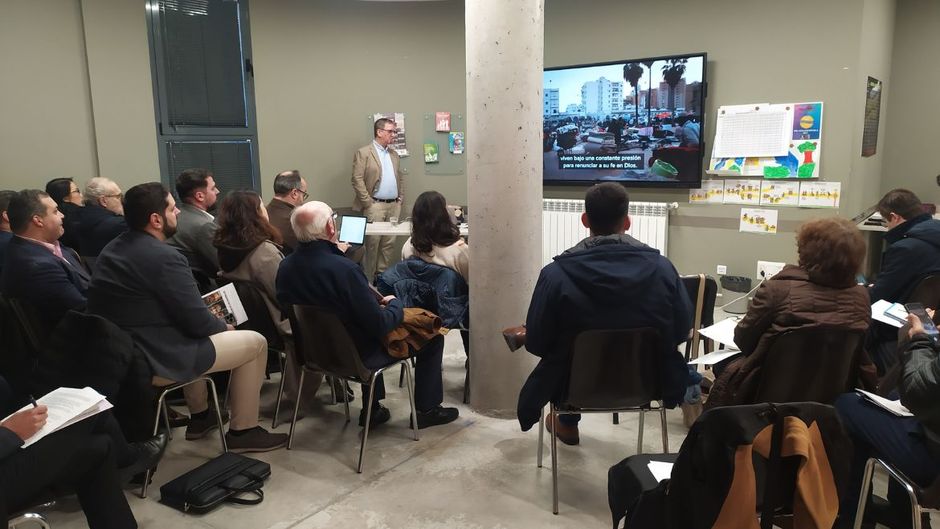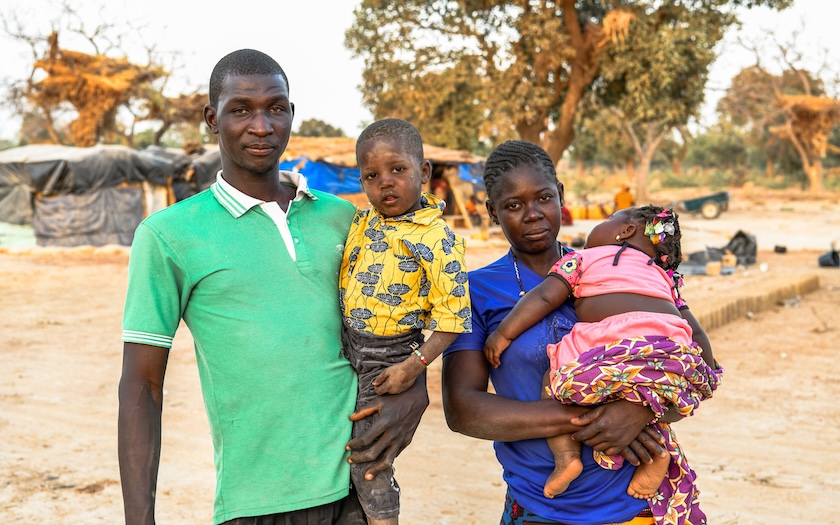We attended the Open Doors press conference in Madrid to get the stories and context of the most widely cited report on persecution of Christians globally.
 A presentation of the 2025 World Watch List during a January 2025 press conference in Madrid. / Carmen Sánchez.
A presentation of the 2025 World Watch List during a January 2025 press conference in Madrid. / Carmen Sánchez.
This year, 380 million Christians around the world have suffered high levels of persecution and discrimination because of their faith, which means that 1 in 7 followers of Jesus suffer such opposition.
Those figures have been collected by the global organisation Open Doors which, as every year, has compiled and ranked the top 50 countries where Christians face the most extreme persecution in its World Watch List (WWL).
On the occasion of the launch of the 2025 WWL, Puertas Abiertas (Open Doors in Spain) held a press conference in Madrid, inviting representatives of various media, political parties and social and religious entities.
The event was led by the national director of the organisation since 2011, Ted Blake, who expressed his concern about the increase in the intensity of persecution in the world, reflected in the rise of 15 million Christians affected by this situation compared to last year.
Blake explained that “the list is compiled by a team of analysts who are experts in their fields of study with postgraduate or doctoral degrees (...) The list is externally audited by the International Institute for Religious Freedom and is considered to be the most reliable list of its kind”.
Part of this methodology lies in the use of three colours that classify countries according to different levels of persecution: high, very high and extreme.
However, on the current map, it is only possible to see the colours for the two highest levels, as “the top 55 or 56 countries are in this situation”, said Blake.
He stressed that there are currently 74 countries where Christians are persecuted; this means that the 50 positions of the WWL no longer cover all the countries where believers are suffering for their Christian faith.
There are several factor that lead to the suppression of religious freedom. “While violence is the common factor among those countries, their socio-cultural contexts are”, and these contexts range “from tightly controlled autocratic states to unstable countries due to weak governance or civil war”.
During the press conference, the organisers presented a video showing the five most affected countries, the reasons why and the consequences.
Those states, which stand out for the violence and pressure experienced by “local Christians in private, family, community, national and church life”, are North Korea, Somalia, Yemen, Libya, and Sudan.
In each of the countries featured on the list, Christians are subjected to different forms of opposition and discrimination.
Denial of rights and deprivation of liberty, making it impossible to live within the country as a follower of Jesus, is a strategy used in places like North Korea.
Another way of persecution in the country is to make use of authoritarianism, a situation that is not unique to North Korea, but which other countries such as Kyrgyzstan are also taking advantage of.
The use of disinformation is an element used by states such as Iran or India, where false accusations against Christians are published in order to provoke a negative attitude from the rest of the population towards them.
In Iran, although the country's statutes and regulations recognise religious freedom and freedom of assembly, Christians who exercise their right of assembly are arrested.
This violation of the right to assembly is also taking place in Algeria, where during the COVID-19 pandemic, all places where people gathered were closed; however, today they have again allowed all of them to be opened, excluding Christian meeting places. Today, there are no evangelical churches left open in the country.
On the other hand, in China, Cuba or Nicaragua, churches are being attacked, forcing Christians to hold their services clandestinely for security reasons. In the latter two countries, the government itself is carrying out the attacks.
The director of Open Doors Spain illustrated that when we think of technology, it probably crosses our minds how favourable this tool is, how much it helps us to work or to be connected with the people we love who live far away. However, in countries such as China, this technology is being used to carry out a digital persecution against those who live for Jesus.
The harassment is applied through cameras installed in the streets that use Artificial Intelligence, facial recognition and biometric analysis. China is already selling such technology to other, mostly authoritarian, countries.
More and more are turning to the use of these technologies as a weapon, like the well-known Boko Haram organisation, which uses drones to track and attack Christians.

[photo_footer]Pastor Soré and his family, displaced to a refugee camp because of their faith. / Photo: Open Doors Spain. [/photo_footer] Blake also mentioned the 16 million Christians living in refugee camps in Africa. Many of them are in Nigeria, where the distribution of humanitarian aid, carried out by Muslims, is unequal, prioritising and favouring those who identify with their own religion.
The director of Open Doors Spain explained that they have started to spread the word about WWL at the political and governmental level, trying to reach out to those who need to know about and deal with this overwhelming reality.
“You have to start somewhere, and Open Doors Spain is starting at the local and national level”, said Blake.
That is why the organisation had invited different political representatives to the press conference, and took the opportunity to make some recommendations and requests.
First, he pointed out that freedom of religion and belief should be a priority to be fulfilled by the countries with which Spain negotiates in terms of foreign policy and trade negotiations.
In the European Union, Open Doors Spain calls for the reappointment of the Special Envoy for the Promotion of Freedom of Religion or Belief.
Regarding humanitarian aid, they propose to promote non-discriminatory distribution, and to establish solid policies so that those forcibly displaced from their place of origin or residence can legally return to their homes on equal terms.
Moreover, he asked to limit and control the use of technology in a way that respects human rights at the United Nations.
Blake made several recommendations for specific countries. Firstly, he urged to request a visit by a UN rapporteur to North Korea, so that he can assess the dire human rights situation in the country. For Nigeria he called for a study of the violence there by an international commission, as the media currently claim that this brutality is related to trade or land issues.
Such claims miss the main purpose of the abuses: an attempt to exterminate Christianity in order to establish full Muslim law in the country.
Finally, he called on the Algerian government to allow the country's Protestant association to be legalised, so that churches can no longer be closed and can operate freely.
The work of Open Doors has a crucial impact on the lives of millions of people. Through their work, over 8 million people have received Bibles and Christian literature, legal support and advocacy, or post-traumatic care.
The organisation insists that “prayer is the most important part”, the way Christians can all help by remembering and supporting fellow believers who suffer from violence and pressure because of their faith in Jesus Christ. “But I tell you, love your enemies and pray for those who persecute you”, says Jesus in Matthew 5:44.
"The media isn't prone to reporting these stories, but what issues affecting over 300 million people don't make the front page news?”, asked Blake in Madrid.
If anyone want to contribute to the work of Open Doors, there is always the chance to give donations. But one can also serve as a volunteer in the role that best suits one's skills and passions, or by spreading the word about this NGO in church or among friends.
[analysis]
[title]One more year[/title]
[photo][/photo]
[text]At Evangelical Focus, we have a sustainability challenge ahead. We invite you to join those across Europe and beyond who are committed with our mission. Together, we will ensure the continuity of Evangelical Focus and Protestante Digital (Spanish) in 2025.
Learn all about our #OneMoreYearEF campaign here (English).
[/text][/analysis]

Las opiniones vertidas por nuestros colaboradores se realizan a nivel personal, pudiendo coincidir o no con la postura de la dirección de Protestante Digital.
Si quieres comentar o